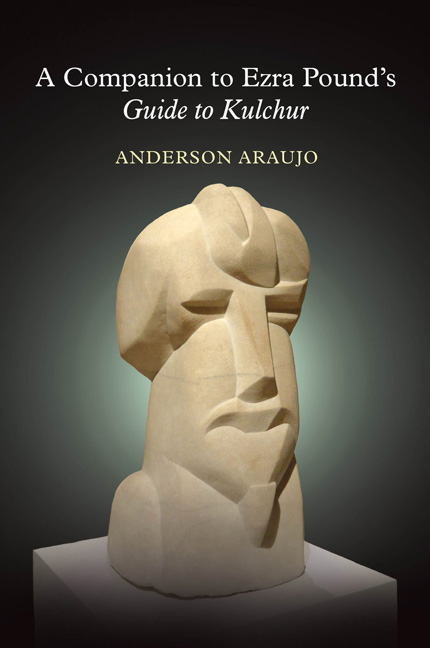Book contents
- Frontmatter
- Contents
- Acknowledgments
- Abbreviations
- Introduction
- Guide to Kulchur
- Part I
- Section I
- Section II
- Part II
- Section III
- Section IV
- Part III
- Section V
- 15 Values
- 16 Europe Or The Setting
- 17 Sophists
- 18 Kulchur: Part One
- 19 Kulchur: Part Two
- 20 March 12th
- 21 Textbooks
- Section VI
- Part IV
- Section VII
- Section VIII
- Section IV
- Part V
- Section X
- Section XI
- Part VI
- Section XII
- Section XIII
- Addenda: 1952
- Notes
- Index
17 - Sophists
from Section V
- Frontmatter
- Contents
- Acknowledgments
- Abbreviations
- Introduction
- Guide to Kulchur
- Part I
- Section I
- Section II
- Part II
- Section III
- Section IV
- Part III
- Section V
- 15 Values
- 16 Europe Or The Setting
- 17 Sophists
- 18 Kulchur: Part One
- 19 Kulchur: Part Two
- 20 March 12th
- 21 Textbooks
- Section VI
- Part IV
- Section VII
- Section VIII
- Section IV
- Part V
- Section X
- Section XI
- Part VI
- Section XII
- Section XIII
- Addenda: 1952
- Notes
- Index
Summary
Suretyship: “Responsibility undertaken by one person on behalf of another for the performance of some act, such as for payment of a debt.”
seven sages: Cf. note GK 79.
Salmasius … wrote De Modo Usurarum: Allusion to the very public literary spat between Salmasius and the English poet, critic, and iconoclast John Milton (1608–74). In response to Salmasius's Defensio regia pro Carolo I (1649), an apologia for Charles I, which along with other contemporary works was used to vilify Milton as a regicide, Milton wrote Pro populo Anglicano Defensio Contra Claudii Anonymi, alias Salmasii, Defensionem Regiam (1651) (A Defence of the People of England, In Answer to Salmasius's Defence of the King), a sustained assault on Salmasius's arguments, especially for the divine right of kingship (cf. note GK 30).
Bourbon: A member of the Bourbons, a European dynastic family that ruled France from 1589 to the French Revolution in 1789 and Spain from 1700 to the declaration of the Second Republic in 1931 and from 1975 to the present.
Stuart: A member of the House of Stuart dynasty, the first royal dynasty to rule Great Britain with the accession to the throne of James VI of Scotland, son of Mary Stuart, Queen of Scots, following the death of Elizabeth I in 1603.
Rostovtzeff: Cf. note GK 41.
the unreadable and dull Ferrero: Guglielmo Ferrero (1871–1942), Italian historian, sociologist, and author of the five-volume The Greatness and Decline of Rome (1902–6), among a number of other works.
Malatesta and the late condottieri: Cf. note GK 2.
Valturio: Roberto Valturio (1405–75) dedicated to Malatesta his magnum opus, De re militari (1472), a treatise on military strategies, formations, and technologies, along with the values and principles of ancient warfare and qualities that make the perfect condottiere. Valturio is buried in Malatesta's Tempio in Rimini.
Vickers’ advertisement: A British manufacturer of a range of military submarines, aircraft, arms, and warships, Vickers Limited rose to prominence during the First World War, widely advertising its military products and services.
- Type
- Chapter
- Information
- A Companion to Ezra Pound's Guide to KulcherGuide to Kulcher, pp. 157 - 167Publisher: Liverpool University PressPrint publication year: 2018

